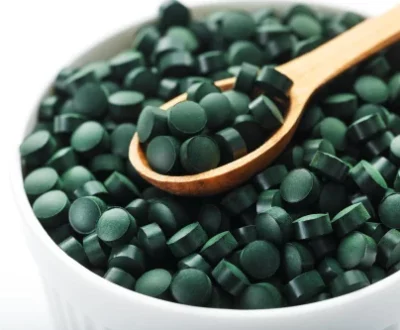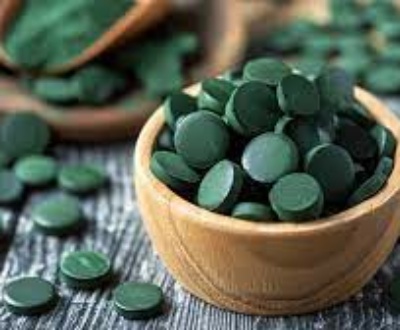What is Spirulina?

What is Spirulina?
Spirulina is often hailed as one of the most powerful superfoods available today. Packed with an impressive array of nutrients, including protein, vitamins, minerals, and antioxidants, spirulina is a type of blue-green algae that grows in both fresh and saltwater. Its unique nutritional profile and health benefits have made it a popular supplement in the wellness community, with proponents claiming it can boost energy, support the immune system, improve gut health, and even help detoxify the body. But what exactly is spirulina? How does it work, and why has it become such a sought-after supplement?
In this article, we’ll explore the origins of spirulina, its nutritional content, the health benefits it offers, its potential side effects, and the best ways to incorporate it into your diet. Whether you are already using spirulina or are considering adding it to your health regimen, this guide will provide valuable insights into this remarkable nutrient powerhouse.
The Origins of Spirulina
Spirulina has been around for billions of years, making it one of the oldest life forms on Earth. It is a type of cyanobacteria, a group of microorganisms that can photosynthesize like plants. These microorganisms are often referred to as blue-green algae due to their bluish-green color, which is the result of the pigment phycocyanin that they produce.
Historically, spirulina has been used as a food source by various indigenous cultures. The Aztecs of Central America were known to harvest spirulina from lakes, and the Kanembu people of Chad have been consuming spirulina for centuries. In fact, spirulina’s potential as a food source was recognized long before it gained fame in modern nutrition circles.
Spirulina is typically grown in warm, alkaline water, often in controlled environments like large freshwater ponds or tanks. Today, it is primarily cultivated in countries with the right climate, including the United States, India, and China. Due to its rapid growth rate and minimal resource requirements, spirulina has been considered a sustainable source of nutrition in recent years.
The Nutritional Profile of Spirulina
One of the key reasons spirulina has earned its reputation as a “superfood” is its exceptional nutrient density. Despite its tiny size, spirulina is packed with a wide range of essential nutrients that can support overall health and wellbeing. Here’s an overview of the key nutrients found in spirulina:
1. Protein
Spirulina is a rich source of protein, containing approximately 60-70% protein by dry weight. This makes it one of the highest plant-based sources of protein available. The protein in spirulina is considered a complete protein, meaning it contains all nine essential amino acids that the body cannot produce on its own. This makes spirulina an excellent protein source for vegetarians and vegans, as well as anyone seeking to supplement their diet with more plant-based protein.
2. Vitamins
Spirulina is also a great source of several essential vitamins, including:
- Vitamin B1 (Thiamine): Important for energy production and nervous system function.
- Vitamin B2 (Riboflavin): Plays a role in energy production and helps the body process fats, carbohydrates, and proteins.
- Vitamin B3 (Niacin): Supports energy metabolism, the nervous system, and skin health.
- Vitamin B12 (Cobalamin): Crucial for nerve function and the production of red blood cells. Spirulina contains a form of vitamin B12, though it is not always bioavailable to humans and may not fully replace the need for other sources of B12.
- Vitamin A: Spirulina contains beta-carotene, a powerful antioxidant that the body can convert into vitamin A. Vitamin A is important for vision, immune function, and skin health.
- Vitamin K: Plays a key role in blood clotting and bone health.
- Folate (Vitamin B9): Essential for DNA synthesis and cellular growth, making it particularly important for pregnant women.
3. Minerals
Spirulina is rich in a variety of important minerals, including:
- Iron: Spirulina contains a bioavailable form of iron that is well-absorbed by the body, making it a great option for those with iron deficiencies or anemia.
- Magnesium: Important for muscle function, nerve function, and bone health.
- Calcium: Essential for bone and teeth health, as well as muscle function.
- Potassium: Helps regulate fluid balance and supports proper nerve and muscle function.
- Zinc: Plays a role in immune function, protein synthesis, and DNA synthesis.
- Copper: Necessary for the production of red blood cells and proper immune function.
4. Antioxidants
Spirulina is rich in a variety of antioxidants, which help protect the body from oxidative stress and inflammation. Some of the most notable antioxidants in spirulina include:
- Phycocyanin: This blue pigment is unique to spirulina and has powerful antioxidant and anti-inflammatory properties.
- Beta-carotene: A precursor to vitamin A, beta-carotene is a potent antioxidant that helps protect cells from damage caused by free radicals.
- Chlorophyll: Spirulina contains a high amount of chlorophyll, which has detoxifying and anti-inflammatory properties.
5. Essential Fatty Acids
Spirulina contains small amounts of essential fatty acids, including gamma-linolenic acid (GLA), an omega-6 fatty acid that has been linked to anti-inflammatory effects and improved skin health.
6. Carbohydrates
Spirulina is low in carbohydrates, which makes it a good option for those following low-carb or ketogenic diets. The carbohydrates in spirulina primarily come from polysaccharides, which are complex sugars that provide energy in a slow-release form.
7. Fiber
Spirulina contains a small amount of dietary fiber, which supports digestive health and helps maintain a healthy gut microbiome.
Health Benefits of Spirulina
Given its nutrient density, spirulina offers a wide range of health benefits. While more research is needed to fully understand the extent of these effects, several potential health benefits of spirulina are supported by scientific studies and anecdotal evidence.
1. Boosting Energy Levels
Many people who consume spirulina report feeling more energetic and less fatigued. This effect is likely due to the high concentration of B vitamins, iron, and protein, which help support energy production in the body. Additionally, spirulina’s rich antioxidant content may help reduce oxidative stress, leading to improved overall vitality.
2. Supporting Immune Function
Spirulina has been shown to support immune function in several ways. Its high levels of vitamins, minerals, and antioxidants help the body fend off infections and boost overall immune health. In particular, phycocyanin, the blue pigment in spirulina, has been shown to have anti-inflammatory properties, which may help modulate immune responses and prevent excessive inflammation.
3. Improving Gut Health
The fiber in spirulina can help support a healthy gut microbiome, promoting digestion and regular bowel movements. Some research suggests that spirulina may also enhance the growth of beneficial gut bacteria, contributing to improved digestive health.
4. Detoxification
Spirulina is often used as a natural detoxifier due to its high chlorophyll content. Chlorophyll has been shown to help detoxify the body by binding to heavy metals and other toxins, making it easier for the body to eliminate them. Spirulina’s antioxidant properties also help neutralize free radicals, which can contribute to cellular damage and inflammation.
5. Supporting Heart Health
Spirulina may have a positive effect on heart health by reducing cholesterol levels, lowering blood pressure, and improving blood lipid profiles. Some studies have suggested that spirulina can reduce total cholesterol and LDL (“bad”) cholesterol while increasing HDL (“good”) cholesterol. Its antioxidant properties also help protect the cardiovascular system from oxidative stress.
6. Managing Blood Sugar
Some research indicates that spirulina may help regulate blood sugar levels, making it beneficial for people with type 2 diabetes or those at risk of developing the condition. It may help improve insulin sensitivity and lower blood glucose levels, which could contribute to better blood sugar control.
7. Supporting Muscle and Bone Health
The protein and calcium content in spirulina may help support muscle growth and repair, particularly for those who engage in regular physical activity. Additionally, spirulina’s mineral content, including magnesium and calcium, is beneficial for maintaining healthy bones and preventing bone density loss.
8. Weight Management
Spirulina is low in calories but rich in protein, which can help promote feelings of fullness and reduce overall calorie intake. As part of a balanced diet, spirulina may aid in weight management by curbing hunger and supporting metabolic health.
Potential Side Effects and Considerations
While spirulina is generally considered safe for most people when consumed in moderate amounts, it is important to be aware of potential side effects and precautions:
- Allergic Reactions: Some people may be allergic to spirulina, experiencing symptoms such as itching, swelling, or difficulty breathing. If you experience any of these symptoms after consuming spirulina, stop use immediately and consult a healthcare provider.
- Heavy Metal Contamination: Spirulina can sometimes be contaminated with heavy metals if it is not grown in a controlled environment. It is important to purchase spirulina from reputable sources that test for contaminants.
- Gastrointestinal Issues: Some individuals may experience mild digestive issues such as bloating, gas, or nausea when first starting spirulina. These symptoms usually subside as the body adjusts.
- Pregnancy and Breastfeeding: While spirulina is generally considered safe, pregnant or breastfeeding women should consult their healthcare provider before taking spirulina supplements, as its effects during pregnancy have not been extensively studied.
How to Incorporate Spirulina into Your Diet
Spirulina is typically available in powder, tablet, or capsule form. It can be easily incorporated into your diet in a variety of ways:
- Smoothies: Add a teaspoon or two of spirulina powder to your favorite smoothie for an extra nutritional boost.
- Juices: Stir spirulina powder into fruit or vegetable juices for a quick and easy way to consume it.
- Baked Goods: You can add spirulina powder to baked goods like muffins or energy bars for a nutritious twist.
- Salads and Soups: Sprinkle spirulina powder on salads or stir it into soups for added nutrition.
- Capsules or Tablets: If you prefer a more convenient option, spirulina is available in capsule or tablet form, which can be taken with water.
Conclusion
Spirulina is a remarkable nutrient powerhouse that offers a wide range of health benefits, from boosting energy levels to supporting immune function and promoting overall wellness. With its impressive nutritional profile and growing popularity, spirulina is a valuable addition to any healthy diet. Whether you’re looking to improve your fitness, detoxify your body, or simply enhance your nutrient intake, spirulina is a natural and effective way to nourish your body.
As with any supplement, it’s important to consult with a healthcare provider before adding spirulina to your regimen, especially if you have underlying health conditions or are pregnant or breastfeeding. When consumed responsibly, spirulina can be a safe and powerful addition to your daily health routine.
Subscribe to our Newsletter.
Keep Reading
See all posts
Terms | Privacy | Disclaimer
© 2012-23 Kalptaru Agro. All Rights Reserved



